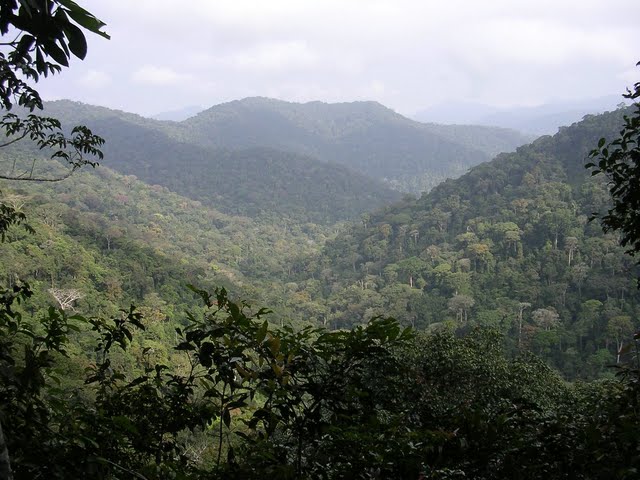Equatorial guinea: Equatorial guinea Tourism Profile
2015/03/10

Improved road infrastructure boosts tourism development in the region
Equatorial Guinea has become one of the African states with the best road infrastructure covering its entire territory. New roads connecting the port city of Bata, located in Rio Muni, the part of Equatorial Guinea which is on the African mainland, to Cameroun and Gabon have helped to improve connections for commercial exchange and travel and tourism in the West Africa region. Additional visitors are coming to the country because of its well developed infrastructure and relatively good travel accommodation inclunding to visit natural sites and places of interest in neighbouring nations.
Air companies expand their international connections to Equatorial Guinea
The majority of airlines flying to Equatorial Guinea focus on services to European nations such as Spain, France, Switzerland and Germany as these are the key source nations for inbound arrivals to the country. The leading airlines serving Equatorial Guinea include Iberia, Ceiba Intercontinental Airlines and Air France. As for connections within Africa, Camair, Air Gabon, Ethiopian Airways and Royal Air Maroc are the key airlines.
Increasing request drives the expansion of hotels
Development of luxury leisure tourism becomes a major priority
Equatorial Guinea has all of the advantages of a country which seeks to attract inbound leisure tourists, in particular affluent inbound tourists. Its a lot of high-class hotels and solid infrastructure, combined with magnificent natural sites and pristine beaches make Equatorial Guinea very attractive for luxury leisure tourists. A trip was organised during May 2013 for European travel journalists and representatives of several leading operators in travel retail with the aim of promoting the country as a luxury travel and tourism destination. Some of the potential for high-price inbound travel and tourism can be seen in the Sipopo luxury resort, located just outside the country’s capital, Malabo.
Ecotourism with a particular focus on comfort and luxury
In addition to its booming oil industry, Equatorial Guinea offers a rich biodiversity of tropical flora and fauna, inclunding volcanic islands and rainforests. The government is in the process of tapping into the country’s strong potential for the development of ecotourism by using revenues derived from its oil and gas extraction industry. Improved infrastructure in the country is helping to make Equatorial Guinea additional attractive for inbound leisure tourists. Eco-lodges could any minute at this time become part the niche accommodation models with high increase potential over the estimate period.
With vast pristine land- and seascapes, highly developed ground infrastructure, and an attractive climate, Equatorial Guinea stands to become one of the leading ecotourism destinations in Africa with it’s tropical beaches and activities such as hiking, canoeing, and fishing.
In recent years, the country has developed large hotel infrastructure, and the government has made it a priority to remove obstacles to development, including administrative procedures, difficulties in obtaining visas, insecurity and corruption.
Existing foreign presence in the tourism sector includes the Accor Group with four hotels: two Sofitel properties (Sofitel Malabo President Palace Hotel; Sofitel Malabo Sipopo Golf) and two Ibis properties (in Malabo and Bata).
Economic recession slows down increase in arrivals
Increase in arrivals to Equatorial Guinea slowed down in 2009, due to the economic recession. The country’s inbound tourism is heavily dependent on business tourism, particularly from the US. With the US economy expected to rebound only marginally in 2010, increase in arrivals will continue to be limited by the economic recession over the estimate period.
Inbound tourism continues to be driven by oil-related business tourism
Since the discovery of new oil fields in 1999, business tourism has been the mainstay of inbound tourism in Equatorial Guinea. New oil exploration projects by Chinese company, CNOOC, will continue over the estimate period. US-based oil companies such as Exxon Mobil are as well investing heavily in Africa, in order to reduce dependence on Middle East oil resources. Oil- and gas-related business tourism will continue to drive inbound tourism in Equatorial Guinea over the estimate period.
Business tourism helps to exploit ecotourism
Besides oil, Equatorial Guinea offers a rich biodiversity of tropical flora and fauna, including volcanic islands and rainforests. The government is tapping into the country’s potential for ecotourism, by using revenues from oil-and gas-related trade. Infrastructure projects, such as the development of paved roads in each town and city, will help to make Equatorial Guinea additional attractive to leisure tourists over the estimate period.
Equatorial Guinea establishes new air links with Africa
Ceiba Intercontinental Airline, the national airline of Equatorial Guinea, commenced operations only in 2007. Based on security and safety concerns, the company remains on the inventory of airlines banned by the EU. As a result, it is in the process of expanding its routes within Africa. The company added Accra (Ghana) in 2009, and hopes to use this as a base to connect to other West African nations over the estimate period. Kenya Airways added Equatorial Guinea to its network in 2009.
Controversies raise concerns over management
controversies marred Equatorial Guinea’s travel and tourism industry in 2009, and raised concerns over management. African Sun (a Zimbabwe-based hotels and resorts group) was involved in a legal battle over non-payment of work carried out on hotels sites. The group subsequently refused to start operations in hotels, citing political instability within the country. In another incident, the chief of the national airline, Ceiba Intercontinental Airline, was falsely accused of fleeing the country with cash meant for negotiating route expansions. The story was later retracted. However, such controversies may deter foreign investment in Equatorial Guinea’s travel and tourism industry over the estimate period.
- Equatorial guinea News
-
- BOTSWANA: Africa: USA-Africa - No Policy? Bad Policy? or Both?
- BOTSWANA: Africa: U.S. State Department To Get Experienced Diplomat in Key Africa Post
- BOTSWANA: Africa’s economic growth in 2016 was driven by East Africa
- BOTSWANA: Africa property offers rich pickings for the brave
- BOTSWANA: Bill Gates sees US likely to maintain aid levels for Africa
- BOTSWANA: Africa: Graca Challenges Women, Girls to Grab Emerging Opportunities
- Trending Articles
-
- BOTSWANA: Africa: USA-Africa - No Policy? Bad Policy? or Both?
- NIGERIA: Nigeria: Diezani Forfeits N7.6 Billion to Govt
- BOTSWANA: Africa: U.S. State Department To Get Experienced Diplomat in Key Africa Post
- EGYPT: Egypt foreign reserves at highest since 2011 uprising
- GHANA: Falling cocoa prices prompt joint action from Côte d’Ivoire and Ghana
- QATAR: Qatar closes Chad embassy in Doha






